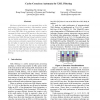Free Online Productivity Tools
i2Speak
i2Symbol
i2OCR
iTex2Img
iWeb2Print
iWeb2Shot
i2Type
iPdf2Split
iPdf2Merge
i2Bopomofo
i2Arabic
i2Style
i2Image
i2PDF
iLatex2Rtf
Sci2ools
194
click to vote
ICDE
2005
IEEE
2005
IEEE
Cache-Conscious Automata for XML Filtering
Hardware cache behavior is an important factor in the performance of memory-resident, data-intensive systems such as XML filtering engines. A key data structure in several recent XML filters is the automaton, which is used to represent the long-running XML queries in the main memory. In this paper, we study the cache performance of automaton-based XML filtering through analytical modeling and system measurement. Furthermore, we propose a cache-conscious automaton organization technique, called the hot buffer, to improve the locality of automaton state transitions. Our results show that (1) our cache performance model for XML filtering automata is highly accurate and (2) the hot buffer improves the cache performance as well as the overall performance of automaton-based XML filtering.
| Added | 01 Nov 2009 |
| Updated | 01 Nov 2009 |
| Type | Conference |
| Year | 2005 |
| Where | ICDE |
| Authors | Bingsheng He, Qiong Luo, Byron Choi |
Comments (0)

